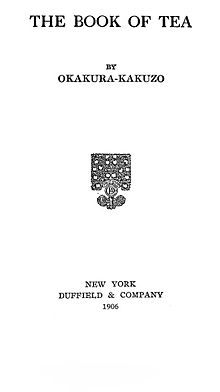The Book of Tea
 Title page of the American edition of The Book of Tea | |
| Author | Okakura Kakuzō |
|---|---|
| Language | English |
| Publisher | Duffield & Company |
Publication date | 1906 |
| Publication place | United States |
| Pages | 160 |
The Book of Tea (茶の本, Cha no Hon) by Okakura Kakuzō[1] (1906) is a long essay linking the role of tea (teaism) to the aesthetic and cultural aspects of Japanese life.
Content
Addressed to a western audience, it was originally written in English and is one of the great English tea classics. Okakura had been taught at a young age to speak English and was proficient at communicating his thoughts to the Western mind. In his book, he discusses such topics as Zen and Taoism, but also the secular aspects of tea and Japanese life. The book emphasizes how Teaism taught the Japanese many things; most importantly, simplicity. Kakuzō argues that this tea-induced simplicity affected art and architecture, and he was a long-time student of the visual arts. He ends the book with a chapter on Tea Masters, and spends some time talking about Sen no Rikyū and his contribution to the Japanese tea ceremony.
According to Tomonobu Imamichi, Heidegger's concept of Dasein in Sein und Zeit was inspired – although Heidegger remained silent on this – by Okakura Kakuzō’s concept of das-in-der-Welt-sein (being-in-the-worldness) expressed in The Book of Tea to describe Zhuangzi's philosophy, which Imamichi’s teacher had offered to Heidegger in 1919, after having followed lessons with him the year before.[2]
See also
References
- ^ 'Ambassador of Tea Culture to the West' (biography of Okakura), Andrew Forbes and David Henley, The Illustrated Book of Tea (Chiang Mai: Cognoscenti Books, 2012).
- ^ Tomonubu Imamichi, In Search of Wisdom. One Philosopher’s Journey, Tokyo, International House of Japan, 2004 (quoted by Anne Fagot-Largeau at her lesson at the College of France of December 7, 2006) Archived February 6, 2009, at the Wayback Machine
- The Illustrated Book of Tea (Okakura's classic illustrated with 17th-19th century ukiyo-e woodblock prints of Japanese tea culture). Chiang Mai: Cognoscenti Books. 2012. ASIN: B009033C6M
External links
- Teaism of Korea
- Tea Life, Tea Mind by 千 玄室, Soshitsu Sen
- The Transform of Tea Drinker’s Aesthetic Inclination of Ming Scholars
- The Book of Tea at Project Gutenberg
- The Book of Tea (html text)
 The Book of Tea public domain audiobook at LibriVox
The Book of Tea public domain audiobook at LibriVox
